Iran's Parliament Speaker Warns Of ‘Harsher Responses’ Against Israel
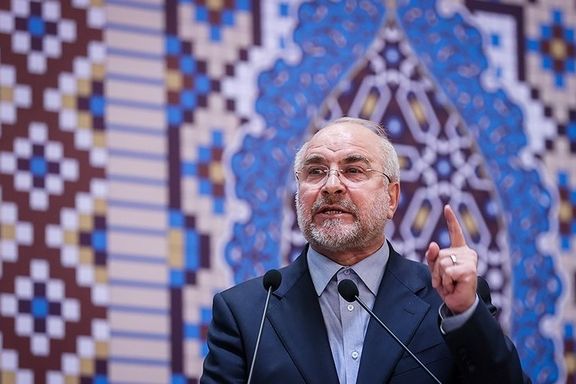
Iranian Parliament Speaker Mohammad Bagher Ghalibaf has warned Israel of “harsher responses” if there is counteraction to Sunday's aerial bombardment.

Iranian Parliament Speaker Mohammad Bagher Ghalibaf has warned Israel of “harsher responses” if there is counteraction to Sunday's aerial bombardment.
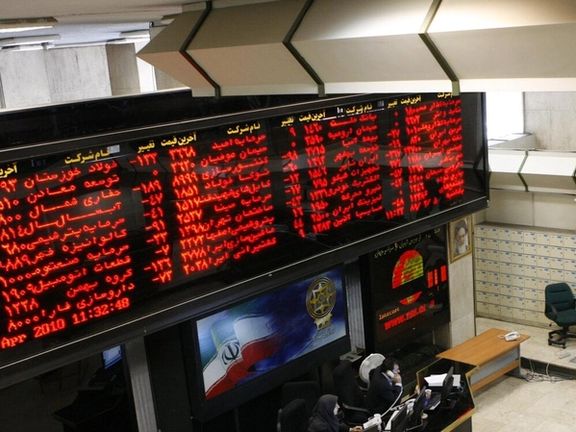
The Tehran bourse has taken emergency measures to limit transactions after market turmoil followed an overnight aerial bombardment by Iran on Israel.
Stock exchange officials decided in an emergency meeting to lower the daily price fluctuation range to one percent for the next three consecutive days in a bid to cool off the market that was witnessing queues of investors trying to sell off their holdings.
The decision came after a sharp fall on the stock exchange which saw the overall index lose more than 11,000 points at the closing of Sunday's trading. The steep decline marked one of the biggest recent history drops, reflecting anxieties over escalating regional tensions fueled by Tehran.
The economic repercussions of the conflict are profound, as Iran's national currency also hit a record low. In the early hours after the attack on Sunday morning, the US dollar rose to pass 710,000 rials but later decreased slightly to reach 674,000 rials, an almost 30 percent depreciation since early January. Other major currencies have also seen historic increases, with the Euro exchanged at 719,200 rials and the British pound trading at 839,600 rials.
A declining currency value could bring more economic hardships for Iranians in the midst of an economic crisis. Now, with the annual inflation rate near 50 percent, savers are converting their money into hard currencies or gold to gain stability at a time when the economic landscape is changing rapidly.
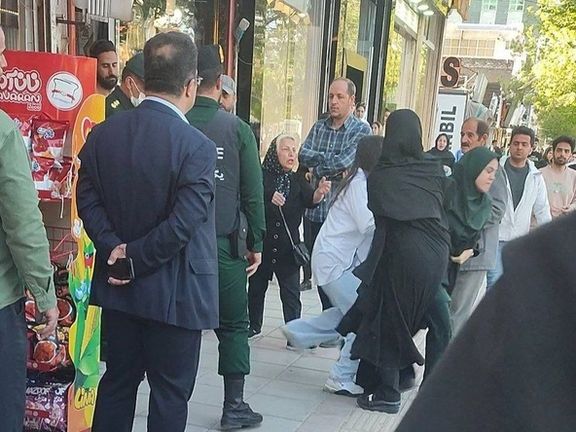
On Saturday, Iran's police initiated a plan to compel unveiled women to adhere to the veil, resorting to violence against detainees and individuals from the public who attempted to intervene to prevent women's arrests.
Supreme Leader Ali Khamenei has twice in the past ten days underlined that ignoring hijab is a redline that should not be crossed and urged the authorities to enforce related laws.
The police have introduced their hijab enforcement initiative, named the Nour (Light) Plan, aiming to enforce hijab laws nationwide in response to what they claim is a "national and public demand." Businesses face closure if they fail to ensure compliance with these regulations among their customers.
Reports from citizens and images circulated on social media suggest that "hijab patrol" vehicles and agents, previously withdrawn from the streets following the death of Mahsa (Jina) Amini while in the custody of the morality police in September 2022, have now resumed operations at full capacity. Amini's death, at the age of 22, sparked extensive protests that persisted for several months.
Since then, there has been a significant increase in the number of unveiled women, even in many traditionally conservative towns and cities.
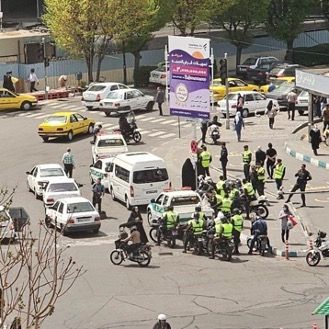
Social media users have reported several cases of violent arrests including the detention of a teenage girl in Tehran by several male and female officers.
“She had clutched the street railings and was crying. A female officer punched her hand, and the male officer forcefully released her fingers. They dragged her to the [police] van. It was as if they had arrested ISIS [members], the scoundrels!” a citizen report on X Saturday said.
According to the author of the tweet, more than a dozen people who were also present at the scene pleaded with the police to let the girl go, a member of the public even offered the girl a headscarf to wear to convince the police not to arrest her, but the police threatened to use tear gas and arrest them if they persisted. “Eventually the pleadings turned into shouting and swearing.”
Another citizen report on X said the police kicked those who opposed the arrest of a young student on the metro.
Uniformed male officers and black-veiled female hijab enforcers patrolling a busy street in Tehran Saturday
Iranian media also reported the arrest, and eventual release, of the wife and daughter of legendary former goalkeeper of Iran's national soccer team, Ahmadreza Abedzadeh, for appearing unveiled in public in Tehran.
IRGC-linked Fars news agency claimed that the mother and daughter were detained for “causing tension and conflict” with hijab enforces and released later.
Some social media users on Saturday said sarcastically that the regime is taking revenge on Iranian women because it does not have the courage to exact its promised “hard revenge” against Israel.
“Hijab enforcers have poured into the streets and the subway, warning women, and trying to humiliate people on the metro and streets as if their enemy is us women. They are desperate and want to exact the hard revenge on us instead of Israel,” Samaneh Sami, a social scientist and journalist tweeted.
Others say the reason for taking action against women at this particular time is to divert attention from such controversial issues as the possibility of a strike against Israel for attacking the Iranian embassy in Damascus on April 1, the massive depreciation of the national currency and other economic problems, the recent land grab scandal of one of Tehran’s Friday imam, and Theran mayor’s plans to build mosques in parks.
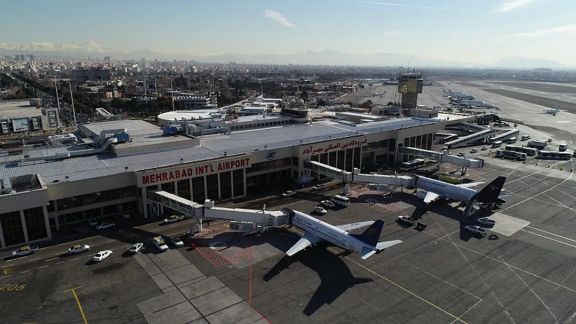
Flights to and from major airports across Iran have been suspended until 6 AM, April 15 due to security concerns following Saturday's missile and drone attack on Israel.
The spokesman of the Iranian Airports and Air Navigation Company, Reza Kargar, told ISNA that cancellations were reported in almost all airports including Tehran, Esfahan, Shiraz, Bushehr, Ilam, Sanandaj, Tabriz, Ardabil, Urmiya, Kermanshah, Khorramabad, Ahvaz, Abadan, Hamedan.
The CEO of Imam Khomeini International Airport City Company explained that "if the alert is renewed, flights will continue to be canceled, and in case the alert is not renewed, flights will resume."
The cancellations followed a massive Iranian drone and missile strike on Israel earlier Sunday that saw over 300 drones and missiles. It comes after an attack on the Iranian Embassy in Damascus on April 1; an attack that Iran has attributed to Israel. The strike killed two IRGC generals and several others.
Despite the scale of the Sunday attack, according to Israel, there were no reported deaths. The defense against the assault was supported by the US, UK, and France.
Besides the attacks launched from Iran, the Islamic Revolutionary Guard Corps (IRGC) has also coordinated missile strikes from Iraq, Syria, and Yemen.
Israeli Channel 12 TV on Sunday quoted an unnamed high-ranking Israeli official assuring that Israel is preparing a "substantial response" to the Iranian moves.
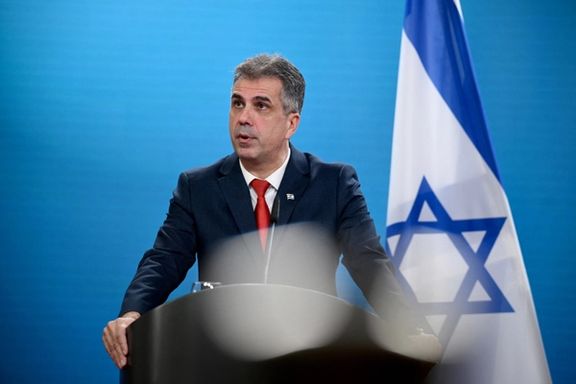
The Israeli Foreign Ministry, addressing the people of Iran via its Farsi page on X, emphasized that its conflict is with the Islamic Republic, not the Iranian people.
The same message was also echoed in English on the ministry's official page.
In response to Iranian claims of causing significant damage, the ministry also posted a video of a fighter jet landing safely at Nevatim Airbase, dispelling the allegations as operations at the base continued unimpaired.
Additionally, a video surfaced from the Iranian parliament where members were seen celebrating the attack on Israel and chanting "Death to Israel!" The Israeli foreign ministry responded stating, "One thing is clear: We are strong, resilient, and we will never give in to terror. Those who harm the people of Israel will pay the price."
The escalation followed an April 1 attack on the Iranian embassy in Damascus, which Iran attributes to Israel, resulting in the deaths of two IRGC generals among others.
Iran's permanent mission to the UN wrote on X that the aerial bombardment was "Conducted on the strength of Article 51 of the UN Charter pertaining to legitimate defense, Iran’s military action was in response to the Zionist regime’s aggression against our diplomatic premises in Damascus."
In a warning to the US which had supported Israel's defensive efforts on Sunday morning along with the UK, France and Jordan, the post said that while the operation was complete, it warned: "The matter can be deemed concluded. However, should the Israeli regime make another mistake, Iran’s response will be considerably more severe. It is a conflict between Iran and the rogue Israeli regime, from which the US MUST STAY AWAY!
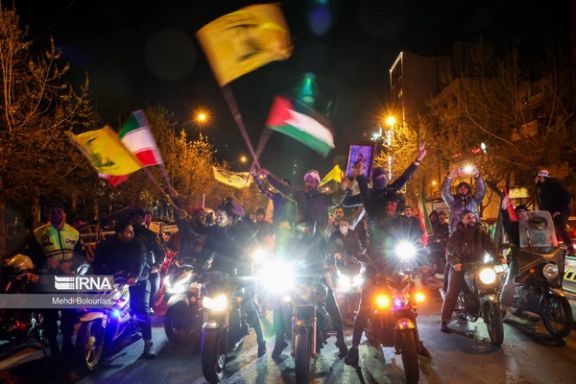
Iranian regime’s direct retaliation against Israel from Iran’s soil establishes beyond any doubt that the ruling clerics are reeking in desperation in the face of Israel’s humiliating April 1 strike.
Israel, escalating its attacks against Iranian targets in Syria, raised the bar and hit a building in Iran’s embassy compound in Damascus, killing seven IRGC officers, who were key in Tehran’s proxy operations. For 13 days, Khamenei was facing a Hobson’s choice.
Khamenei’s regime has been suffering from an unprecedented crisis of legitimacy and credibility in recent years and it seeks to reassure its “armed supporters” within and without the Iranian borders of its enduring rigor and robustness. The retaliation seems to have been a desperate face-saving attempt by Khamenei against all odds.
From the outset the operation was doomed to fail as the low-tech Iranian drones and cruise missiles had to traverse a 1000-mile distance between the two countries. It was inevitable that the behemoth of the Israeli, American, and British regional and satellite surveillance capabilities would detect and track down this cavalcade of slow-moving projectiles en route to the Israeli air space. Thus, the bulk of the Iranian swarm, except for a handful few, amply became an easy prey for American, British, Israeli, and Jordanian air defenses that managed to intercept and shoot them down with agility and precision. Based on early estimates by the Israeli Defense Forces, few of the said projectiles did reach the Israeli air space and even fewer managed to effectuate an impact on any target on Israeli soil. The Iranian regime’s propaganda machine has already staged out jingoistic carnivals on major Iranian city streets that seek to replay the militant Islamic youths’ parades of the Iran-Iraq War (1980-1988) years.
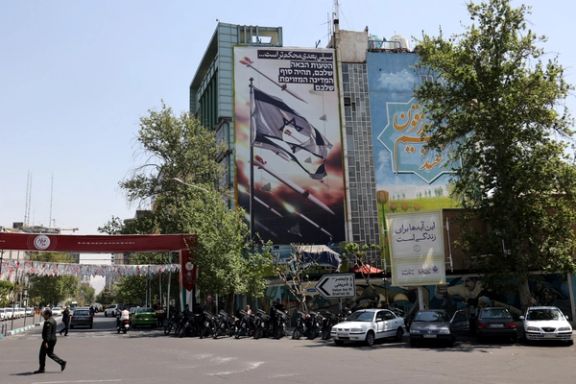
In fact, the gap between the Iranian regime and people at large has been widening at levels reminiscent of the last couple of years of the Iran-Iraq War when the Iranian masses could no longer bear chronic shortages in basic goods, food, high fuel costs, and commodities. The poverty index in the country has reached heights never seen before in contemporary Iranian history and the regime’s lack of legitimacy has even reached the traditional working classes that supplied the bulwark of the volunteer fighters during the Iran-Iraq War. Khamenei’s regime has even lost that critical support base in the recent years.
Since 2018 when US President Donald J Trump pulled out of the nuclear deal with Iran (JCPOA), the Iranian economy has been in a ruinous downward spiral. The ruling clergy and their praetorian IRGC have been struggling to preserve their regime from economic collapse at the hands of runaway inflation, rampant government rentier corruption, a twenty-year drought, widening international sanctions, and dwindling oil revenues. Over the past 6 years the regime has had to face off mass nationwide protests that have called for the regime’s ouster. From November 2019 nationwide brutal crackdown to the unprecedented suppression of the 2022 Woman, Life, Freedom uprising, the regime’s security forces have committed countless crimes against humanity toward civilians. The magnitude of this brutal suppression has led to a fact finding mission mandated by the UN Human Rights Council.
A regime that once professed to be the patron of all “oppressed peoples” is now only in power through its security and military industrial complex. Since 7 October 2023 Hamas attacks on Israel, Iran’s Shia Imperium has unleashed the arsenal of suicide drones, rockets, and missiles (ballistic and cruise) of its armed proxies from Iraq, Lebanon, Syria and Yemen upon Israel, the US bases, as well as the maritime navigation in the Red Sea.
For years, the Islamic regime engaged Israel via its armed proxies, primarily and chiefly, the Hezbollah of Lebanon, Hamas, and the Islamic Jihad of Palestine. The humiliation of having two his top generals killed by Israel on April 1 was, however, a tremendous blow to Khamenei’s brand as a truly anti-Israeli leader amongst Iran’s friends and foes alike. He could no longer hide behind its proxies and had to confront Israel directly.
Irrespective of the miserable failure of the Iranian retaliation against Israel, the Israeli war cabinet has effectively called Khamenei’s bluff by vowing to respond to the Iranian retaliation. As Iran and Israel have no common borders, the war of attrition with Israel will inevitably be an all-out asymmetrical war through proxies. The question is whether Russia and China would continue to economically bail out the Iranian regime. Only time and the continuing strategic value of Iran in the West-East rivalries can answer such a question with certainty.
In the end, Khamenei’s direct attack against Israel from the Iranian soil represents a radical “doctrinal shift” that can only preserve his legitimacy amongst the regime’s regional proxies. In the 1980s, many Iranians perceived the war against Iraq as just. Except for the regime’s ever thinning armed supporters, any war of attrition, direct or asymmetrical, will further burden the collapsing Iranian economy. In this context, most Iranians are economically impoverished and politically discontented with the regime. Moreover, great many of them do not perceive any conflict with Israel as just. Khamenei may soon realize that his gamble to save face will backfire, within and without the Iranian borders.
The opinions expressed by the author are not necessarily the views of Iran International.
Follow developments on Iran International's Live coverage of ongoing tensions between Iran and Israel.
During his Sunday speech Ghalibaf claimed Iran's military aerial bombardment launched Saturday night was a “legitimate response to aggressions against its diplomatic facilities, aligning with United Nations guidelines," referring to the alleged Israeli airstrike on the Iranian consulate in Damascus earlier this month which killed two senior Quds Force commanders and other IRGC personnel.
His statement was followed by the parliament members' reactions, who chanted "Death to Israel!" following the attack on Israeli soil.
Meanwhile Supreme Leader Ali Khamenei’s account on X published a post claiming that Israel had been punished, failing to acknowledge the fact that of the roughly 350 projectiles sent to Israel from Iran, the first such attack of its kind, 99 percent were intercepted by Israel, the US, UK, Jordan and France.
Iran's Army Commander-in-Chief Abdolrahim Mousavi also threatened that “if Israel persists in its actions, this time it will face a harsher and heavier punishment." He threatened the United States that if its bases are used to respond to an attack, "they will be considered operational targets and will be targeted."
Iran's mission to the UN shared a message claiming that it considered the operation "deemed concluded". "However, should the Israeli regime make another mistake, Iran’s response will be considerably more severe," it warned. "It is a conflict between Iran and the rogue Israeli regime, from which the US MUST STAY AWAY!"
Praising the Israeli defensive operation, Israel's defense minister, Yoav Gallant, said, "The IDF operated in an extraordinary manner overnight, and will continue to be prepared for every scenario. The campaign is not over yet and we are alert and strong."






